- Home
- Aharon Appelfeld
To the Edge of Sorrow Page 4
To the Edge of Sorrow Read online
Page 4
Once Michael asked Grandma Tsirl if she is angry with us.
“Why angry? Anger is indecent. We are commanded to love and not be angry.”
“But we do not say the blessings or pray.”
“The ways of the Torah are peaceful ways. He who protects widows, old people, and children observes all the laws of the entire Torah.”
She’s easygoing with adults and warmly welcomes children but is hard on herself. Two days a week, on Monday and Thursday, she fasts. Salo lost his temper and warned her that a woman of her age, under our trying conditions, must eat. Fasting is dangerous for her.
Grandma Tsirl took his hand in hers and said, “I have been fasting for many years and nothing happened. Fasting is like prayer.”
Salo was amazed by her strong will and let her be.
Danzig brought Milio to her and asked her the meaning of his muteness. Grandma Tsirl looked at him and said, “His eyes show that he sees sights and hears sounds. It can be assumed that he saves the words and sights in his heart and won’t let them go to waste. Whose child is he?”
“We found him.”
“Our lawgiver Moses was also a foundling.”
Danzig bowed his head, and his large body fell silent.
“Be wary of silent children; they are destined to reveal the mysteries of the earth,” she said and smiled.
“What should I do?” asked Danzig quietly.
“Read him a chapter from the Book of Psalms every day.”
“He doesn’t understand Hebrew.”
“Prayer does not require understanding, my dear.”
Grandma Tsirl keeps surprising us with astonishing statements.
Ever since Grandma Tsirl told him what to do, Danzig reads Milio a psalm every day and sings him a Yiddish lullaby about a little goat. Milio pays attention to Danzig’s facial expressions, and sometimes a smile crosses his lips. Now and then, to encourage him, Danzig jumps up, claps his hands, and softly sings, “Milio is a big boy; soon he will speak and sing and everyone will say, ‘See how Milio speaks and sings.’ ”
12
The rains are devastating. The canvas tents are no defense against the wetness, but someone is watching over us. One of our patrols discovered a ruin with a roof a mile from our encampment. Kamil and Felix checked it and determined that the ceiling should be reinforced with supporting beams. But, all in all, we could find shelter there.
It appeared to be the abandoned summer home of the landlord of the forest. Some faded paintings still hung on the walls, and there was a stove in the corner. We labored all day to clean it up, and by the evening we were sitting alongside it, enjoying the warmth.
This change improved our mood. The fighters and the children sat around the stove and sang happily, and though the house was a ruin, it reminded us of the city and of the homes we left behind.
Usually we sing softly, almost in a whisper, to be on the safe side. This time our voices were stronger, and the songs were drenched in nostalgia. Grandma Tsirl told us about her childhood in the village, when heaven and earth were connected and God could be felt in every bush and tree, when a Jew stood in the midst of the field and prayed before God as a child stands before his father.
“When did the children grow distant from their father in heaven?” one of the fighters asked Grandma Tsirl.
“They didn’t grow distant, my dear; they serve him in a different way. It is possible to serve God in different ways. Each generation has its own way. We must pray that God will plant thoughts in us that awaken the heart and bring us close to other people.”
That same night Kamil spoke to us candidly and said, “The soldiers and gendarmes are showing no signs of fatigue, and we can assume they will keep trying to surprise us, but we will calculate our every move. We conquered the wetlands on foot, and now we know every hiding place. If they dare to come near us, we’ll demolish them.”
There is a quiet certainty in Kamil’s voice. He gives us faith that the protectors of widows and children are superior in every way to those who seek to eliminate us. We may be few in number, but we are ready to sacrifice our lives. One’s life is dear and important and must be preserved but not at any price. If women are being assaulted, one should be prepared to give up his life and not stand idly by; so, too, if the elderly are being abused. And one should sacrifice himself to prevent the murder of children. The world is enveloped in deep darkness, and we will do whatever we can to minimize that darkness.
This way of thinking is not shared by all. There are pessimists among us who see no way out. “They will not give up on killing us. The death of the Jews is their credo; they will not stop until the last Jew has disappeared.”
Even though he is an introverted man who suppresses dark thoughts, Kamil does not hide from us that the enemy is determined and monstrous. But there’s a good chance that we will survive, on one condition: that we know how to triumph over dark thoughts. Such thoughts must not take root in us. We have seen evil incarnate, and God has appointed us to lead the battle against it.
There are many faces to Kamil. When he speaks about evil and the war we’ve declared against it, he resembles a man who was silent for many years and suddenly awoke and understood what he must do. Recently we heard him tell a patrol, “You are going out tonight to combat evil. Know that you are messengers of the great Jewish faith, which from time immemorial has honored the good and despised evil. Evil is the enemy of humanity, and you are going out tonight to defeat it.”
With Kamil, no deed is important or unimportant. Every deed has great significance. It’s no surprise that many of us wonder where this mysterious man is leading us.
After our comrade Koba fell, there was great despair and depression among us. One of the young fighters wept and banged his head against a tree. Kamil went to him and said, “Remember what I am telling you, death is not the end.”
Every time a fighter falls, our lives are diminished. As of now, three comrades have fallen. We laid them to rest, and they are buried not far from here. Only we know where. The graves are marked on Kamil’s field map, and whenever we happen by the burial place, we leave wildflowers on the graves. In this silent moment we again see their young faces.
* * *
—
THE WETLANDS HAVE many dangers, among them forgetfulness. To overcome this, each Saturday night we hold a memorial for one fighter, or for his parents or grandparents. At first we remembered the hundreds who were taken from the ghetto and ordered to dig burial pits for themselves. Then one comrade remarked that we must not lump so many people together. Better for us to reflect on the memory of a single fighter—talk about what he did in his life or, more correctly, what he managed to accomplish—and to bond with him and his parents. Since then, every Saturday night we bond with our city and one fighter, and with his father and mother. If we forget one or two details, Grandma Tsirl helps us. Nothing escapes her memory.
Most days, and sometimes even on Saturday nights, we stick firmly to our schedule: patrols, ambushes, and raids. A raid that passes without injuries is a victory and holiday.
Usually we raid one of the outlying houses of a village. More than once, we’ve found armed robbers holed up in these houses, or gendarmes waiting in ambush. Having been stung in the past, we now post a lookout and collect information. Without information, we won’t raid even a storeroom.
I don’t want to mislead: Yes, our lives hang by a thread, but we aren’t miserable. Even a small success makes us happy. Yes, there are days of setbacks, overwhelming problems, blinding despair. These have taken a heavy toll but do not undermine our will to overcome the enemy. We focus fully on our foe. In order to defeat him we are ready to grit our teeth, conquer our pain, and steel our souls for peril.
There are also miracles. Once, while on our way to raid one of the small farms, we came upon a midsize building about a mile from the farm. We broke in, and before our eyes was a breathtaking sight: sacks filled with potatoes, cabbage, and onions, and beside them sacks filled with apples, pears, prunes, and sunflower seeds.
We didn’t know where to begin, how to transport this load to the base, and it was good that quiet, restrained Felix was leading the operation. He immediately ordered us to move the sacks in stages; some of us would stand guard and some would do the moving. That way, taking turns, we would take out as many sacks as possible and move them to the base.
Every return to the base is a celebration, a joyful relief. Kamil stood at the entrance and hugged every one of us. For the first time we filled Hermann Cohen’s storage room to the brim with fresh produce. There were of course a few complainers who did not fail to remind us that we were engaging in theft and looting and not warfare, and that the time had come to fight those who persecute us. Yes, they say, we need supplies in order to exist, but we must not confuse existence with duty. Our duty is to fight. Every day that we don’t fight is submission and acceptance. And worse: we are enabling the murders to continue. Kamil does not dismiss these claims, but he believes that for now we should patiently accumulate weapons and ammunition, entrench ourselves, and bring in more people. We must prepare for war but not commit suicide.
13
We are in the middle of the wetlands and the middle of autumn. The sky is dark even during the day. Every few feet there is a stream or bog, and a lake not far away. The ruin we’d hoped would shelter us turned out to be dangerous, and we went back to living in tents.
It’s strange how this much water and the smells of the damp forest can affect you. At first you don’t feel a thing; only after a few weeks do you feel the heaviness. You lean on a tree or lie down on a mat of twigs. Before long, the head gr
ows dizzy. This isn’t the dizziness of hunger or weakness: it’s the start of the wetlands delirium.
A few days ago one of the fighters approached Salo and said, “I need to go home.”
“Why?”
“I saw my father today, and he is very ill.”
“We have no home, dear fellow. This is our home.”
“Salo,” said the fighter, “you’re wrong. I saw my father very clearly, lying in bed, very ill. I can tell the difference between imagination and reality.”
When he heard this assertion, Salo lowered his head, then raised his eyes and said, “Dear fellow—I won’t keep it from you—you’ve got the wetlands delirium. We’ve all got it, to some degree. You need to tell yourself: The base is my home. These are my friends. We are fighting together for our existence and to eradicate the evil.”
“And I won’t be able to go back home?”
“After the war, all of us will.”
“And what will happen with my father?”
“The people near him will help him. We are obligated to help one another, here and there.”
The fighter smiled, as if he understood something he hadn’t grasped before. It was a different smile, the smile of someone with wetlands delirium.
After the conversation, the man lay down and fell asleep.
Salo saw him sleeping and said, “The wetlands delirium has hit him hard, but sleep, I assume, will calm him.”
Without a doubt, the water and dampness affect us powerfully. First they attack your body, and then they play tricks with your mind, show you things you cannot change. Kamil warns us not to let the delusions drive us mad; they are as lethal as drunkenness. We must fortify the heart with simple things.
When Kamil speaks of strength and a joyful heart, you get the feeling he isn’t the commander of fighters who have lost their families but a prophet training us to reach a new spiritual level.
Kamil used to say that fear is a parasitic emotion and must be erased completely. Back then his voice had a mysterious sound. But later on he became thin, his face grew hard and bony, and his eyes sank deep into their sockets. He sleeps very little. It’s amazing that he keeps on going. Another man would surely collapse, lose hope, frighten his soldiers.
Kamil is not like other people. His external appearance is sometimes deceptive. He can seem distracted or lost in thought, but those who know him know he is extremely down to earth. Yes, his pragmatism has an air of mystery, but he’s as solid as a rock.
He doesn’t deny that a long bumpy road lies before us, but if we will learn to conquer despair, to stay fixed on our goal, and to understand that being a Jew is no small matter, we will live to see the downfall of the enemy.
Where does this clear conviction come from, people ask themselves. Once, in a burst of euphoria, he exclaimed, “Our war is not merely to stay alive. If we do not come out of these forests as complete Jews, we will not have learned a thing.” It’s hard to get to the bottom of his thinking. It sometimes seems that he, too, is trapped in the wetlands delirium, yet his words sound lucid, purified by experience, and the separation of body and spirit does not apply to him.
When Kamil is excitedly delving inside and striving to uplift us, Felix is curled up, asleep. His day is clearly divided: after his activities, he rests his head on a pile of twigs and falls asleep. Kamil sometimes watches him, marveling.
A true fighter needs to sleep. It cleanses his body of accumulated rubbish. Only after sleep are the legs faithful and the mind focused. This is Felix’s credo in a nutshell, and he fulfills it in practice. He always exudes patience and quiet and a hint of indifference. Compared with him, we seem in constant panic. When he wakes up, he goes to the kitchen, pours himself a glass of tea, and sits down. Sometimes he lights a cigarette. He’s not a compulsive smoker, unlike many of us. It’s immediately apparent that sleep has renewed him.
14
A squad has raided one of the small farms about four miles from the wetlands. It was a difficult raid but without injuries. The men came back with a big haul, including several bottles of vodka, fresh bread, sugar, salt, and many other staples. We wanted to celebrate and thank them, but the fighters were exhausted and collapsed in their wet clothes.
Toward evening they finally recovered and told us that they had gotten lost on the way to the farm, got stuck in a swamp and got out with great difficulty, but once they were out, they were not far from the farm. They woke the farmers and asked them to contribute what they could out of goodwill. The farmers opened their cupboards and pantries, and it looked like they were ready to cooperate. But suddenly one of them pulled a gun from his belt and began shooting. There was no choice but to eliminate him.
Every raid is an encounter with death and with miracles, and there were raids that left us with a horror that we feel to this day. So far, I have participated in only three raids. Kamil feels that I am still young, and my place for now is with the ambushes and patrols. He’s wrong; I’ve gotten stronger in recent months, and I have subdued the fears that troubled me. Now I am trained and quick, and I can do everything my comrades in the raiding squads do, with the same effectiveness.
I’m planning to speak to Kamil soon and ask him to include me in all missions. Kamil knew my father and mother, and sometimes he mentions them. I hope this acquaintance will not prevent him from sending me on daring missions. Without actual raids, I will come out of this war in a state of depression. Kamil needs to understand that.
* * *
—
ONE OF THE RAIDERS appeared to have lost his mind—a tall, handsome guy named Sontag. At first he seemed pleased with the success of the raid, downed two glasses of vodka, and joked about the farmers who tried to outwit the squad. All that was fine, but suddenly he got up and declared, “Long live the People of Israel! No power on earth can defeat them. Moses and Aaron will lead them as they led the Children of Israel in the desert.” From then on he spoke garbled sentences in various languages, recited from memory poems by Heine and Rilke, and blamed his brothers in the ghetto for not heeding his warnings and joining him. Finally, he shouted at Kamil, “Let us avenge our spilled blood!” There was a certain grandeur to his cry, as if he had freed himself from handcuffs that bound him.
Salo got down on his knees, spoke to Sontag gently, and promised him that Kamil would do everything to lead us to victory—meanwhile putting a spoonful of sedative syrup to his lips. Sontag opened his mouth like an agreeable child and swallowed the bitter liquid. He soon lay down and fell asleep.
In the end, there are no raids without injuries. For this reason the joy is incomplete. Tsila tries to overcome the sadness; she works morning, noon, and night. The pots are on the fire, and food and drink are always available. She’s a first-rate cook who makes delicacies out of nothing. It’s no wonder that everyone is nice to her and gladly does what she asks. She gives bigger portions to fighters, and when they go out on raids, she makes them sandwiches and fills their canteens with sweetened water. For children and old people she prepares a special menu. Danzig brings Milio to her, and she makes him a puree of apple or pear.
Milio has been with us for several months. His face has filled out and his eyes are alert, but his mouth is still mute. Danzig reports that now and then he utters a sound, a syllable, and sometimes even a word of sorts. Many agree with Danzig that the child seems to possess special abilities that the rest of us lack. For example, Milio is only two, but he throws and catches a ball with ease and plays jacks.
“What do you mean by ‘special abilities’?” asks one of the fighters.
Danzig is a bit embarrassed by the question but overcomes his embarrassment and says, “Look into his eyes, and you’ll see that he comprehends more than you and I do.”
“Maybe so,” says the man and falls silent.

 Long Summer Nights
Long Summer Nights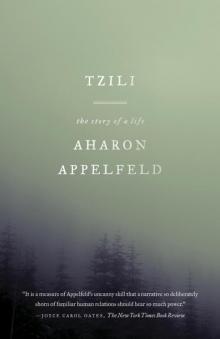 Tzili
Tzili The Conversion
The Conversion The Iron Tracks
The Iron Tracks All Whom I Have Loved
All Whom I Have Loved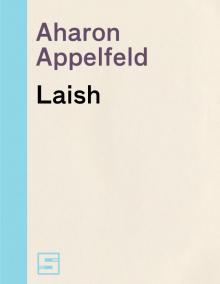 Laish
Laish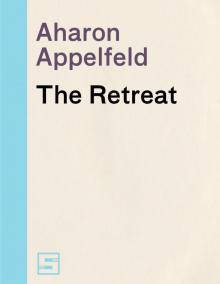 The Retreat
The Retreat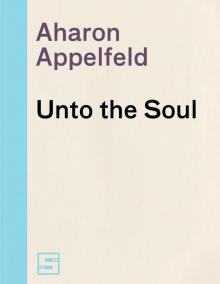 Unto the Soul
Unto the Soul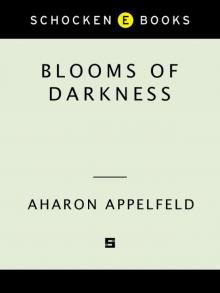 Blooms of Darkness
Blooms of Darkness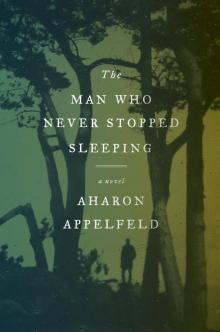 The Man Who Never Stopped Sleeping
The Man Who Never Stopped Sleeping Katerina
Katerina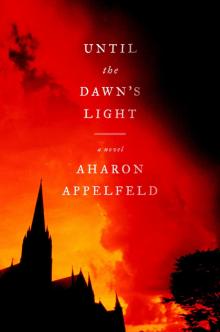 Until the Dawn's Light
Until the Dawn's Light Adam and Thomas
Adam and Thomas Suddenly, Love
Suddenly, Love